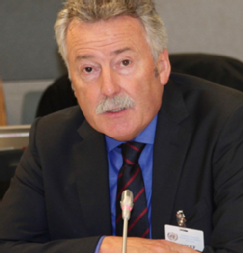Symposium: Restorative Justice and Campus Sexual Harm
This event took place on Wednesday, 22 September 2021, 2-4pm via Microsoft Teams.
The prevalence of sexual harm on university campuses is a serious issue. Conventional approaches to addressing this problem typically fall short of meeting the needs and interests of victims/survivors, perpetrators and the broader community. Restorative justice provides an alternative approach to dealing with sexual harm. In this symposium, we explored what restorative justice can offer victims/survivors, the risks and benefits of taking part in restorative processes, and whether restorative justice can contribute to the prevention of sexual harm on campus by effecting cultural change.
Who was the event aimed at?
This event had particular appeal to those in the university community with an interest in conflict management, such as Discipline teams, Student Support and Wellbeing teams, residential life teams, students and many others.
Speakers Details
Dr Nadia WagerReader in Forensic Psychology University of Huddersfield
|
Nadia joined the University of Huddersfield as a Reader in Forensic Psychology in September 2016. She was previously a Reader in Psychology at the University of Bedfordshire and prior to that a Principal Lecturer in Forensic Psychology at Buckinghamshire New University. She is an Associate Fellow of the British Psychological Society and a Chartered Psychologist (Teaching and Research), having been awarded a PhD from Brunel University in 2002. Nadia’s doctoral studies focused on the impact of occupational stress on employees’ health. Specifically, she examined the psychophysiological responses of employees to their supervisors' interactional styles. In 2009 Nadia completed the British Psychological Society's independent route to achieving Stage One of the Diploma in Forensic Psychology (equivalent to an MSc). Her dissertation for this was a critical review of the potential social-cognitive mechanisms that might potentiate risk for sexual revictimisation. This has served as a catalyst for her on-going empirical research in this area. Find out more. |
Professor Tim ChapmanCentre for Law, Crime & Justice University of Strathclyde
|
Professor Tim Chapman is currently the Chair of the Board of the European Forum for Restorative Justice, and is a leading thinker on youth and criminal justice, including community sanctions and probation. He is widely sought across the world as a trainer, adviser and speaker. He is a key architect of the internationally admired practice guidelines for the Restorative Youth Conference scheme in Northern Ireland and has also trained politically motivated prisoners in restorative practices in order to move them away from violence, as well as more than 60 prison officers. He has also conducted research into the training of judges and prosecutors in restorative justice; this led directly to a new initiative to extend restorative justice to adults within the Northern Ireland court system. Professor Chapman recently led a major six-country research programme examining the contribution of restorative justice to the security experienced by communities affected by conflict in an intercultural context. His academic work setting national standards for probation and criminal justice social work delivery has been highly influential both in England and Wales and in Scotland. Find out more. |
Charlotte CalkinDirector of Restorative Engagement Forum |
Charlotte is Director and Founder of REF, which is leading the way in introducing restorative practices in a wide range of organisations. Charlotte's business and coaching background has helped bring about the introduction of RP into the executive workplace and she has been championing the use of Restorative Practice (RP) in the workplace in many pioneering ways. She supported Aster Housing to become the first organisation outside of the Criminal Justice System to with the RSQM, the quality mark for restorative practice. She has introduced restorative practice to many businesses, ranging from the Independent Office for Police Conduct to local County Councils via everything including elite sport. We work across all sectors; including healthcare, social housing, further education and international development agencies delivering bespoke services. Charlotte works extensively in the Criminal Justice System and has a Master's degree from Cambridge University in Applied Criminology. Her thesis is on Restorative Practice in UK Prisons. She is an accredited trainer and practitioner with the Restorative Justice Council (RJC). REF won the Howard League Award for Restorative Approaches in 2016. The award was for the Police/Youth Restorative Engagement Forums for Gloucestershire, Northamptonshire and Avon & Somerset Police. Charlotte co-wrote the Guidelines for Restorative Justice in Cases of Sexual Harm with the RJC. Find out more. |
Tony WalkerDirector of Restorative Solutions
|
Tony Walker is the Director of Practice Delivery at Restorative Solutions CIC and has been using restorative approaches for over 25 years. Formerly an Inspector in the Thames Valley Police, Tony has many years of experience in RJ, from community problem solving to police complaints. Tony practices as an RJ facilitator, focussing on serious incidents and staff grievances. . Over the last 10 years working with a range of colleagues including Forensic Psychologists who practice with Sex Offenders and specialize in victimology, Tony has developed an assessment template and training programme for using restorative approaches with Harmful Sexual Behaviour. Following this again with colleagues specializing in the arena, he has developed an assessment template and policy and procedure documents for using restorative approaches in cases of domestic violence and abuse. Find out more. |
Alice KingUniversity of Warwick/London Southbank |
Alice is a PhD candidate at the University of Warwick and a Lecturer in Law at London Southbank University. Her research is concerned with understanding student attitudes towards sexual violence and common sexual behaviours at elite (Russell Group) institutions in the UK and thinking about what these attitudes might tell us in the context of behavioural change. Her work explores the relationship between these attitudes and broader discourses relating to power and gender. In particular, she is interested in understanding and theorising about heterosexual masculinities in the elite university environment. Her work is informed by feminist and post-structural theories of power and gender. Over the last academic year, Alice has worked with the Community Values Education Programme at the University of Warwick which focuses on the delivery of bystander intervention programmes. She also sits on the Student Sexual Violence Advisory Board at the University of Warwick in her capacity as a researcher in the area. Alice has presented her findings at a number of difference conferences – to both academic and non-academic audiences. |
Event Agenda
| 2.00-2.10pm | Intro and Welcome |
| 2.10-2.40pm | Nadia's Talk and Q&A |
| 2.40-3.00pm | Tim's Talk and Q&A |
| 3.00-3.05pm | Break |
| 3.05-3.30pm | Charlotte's Talk and Q&A |
| 3.30-4.00pm |
Panel with speakers and invited guests, including Tony Walker (Director of Restorative Solutions) and Alice King (University of Warwick) |




